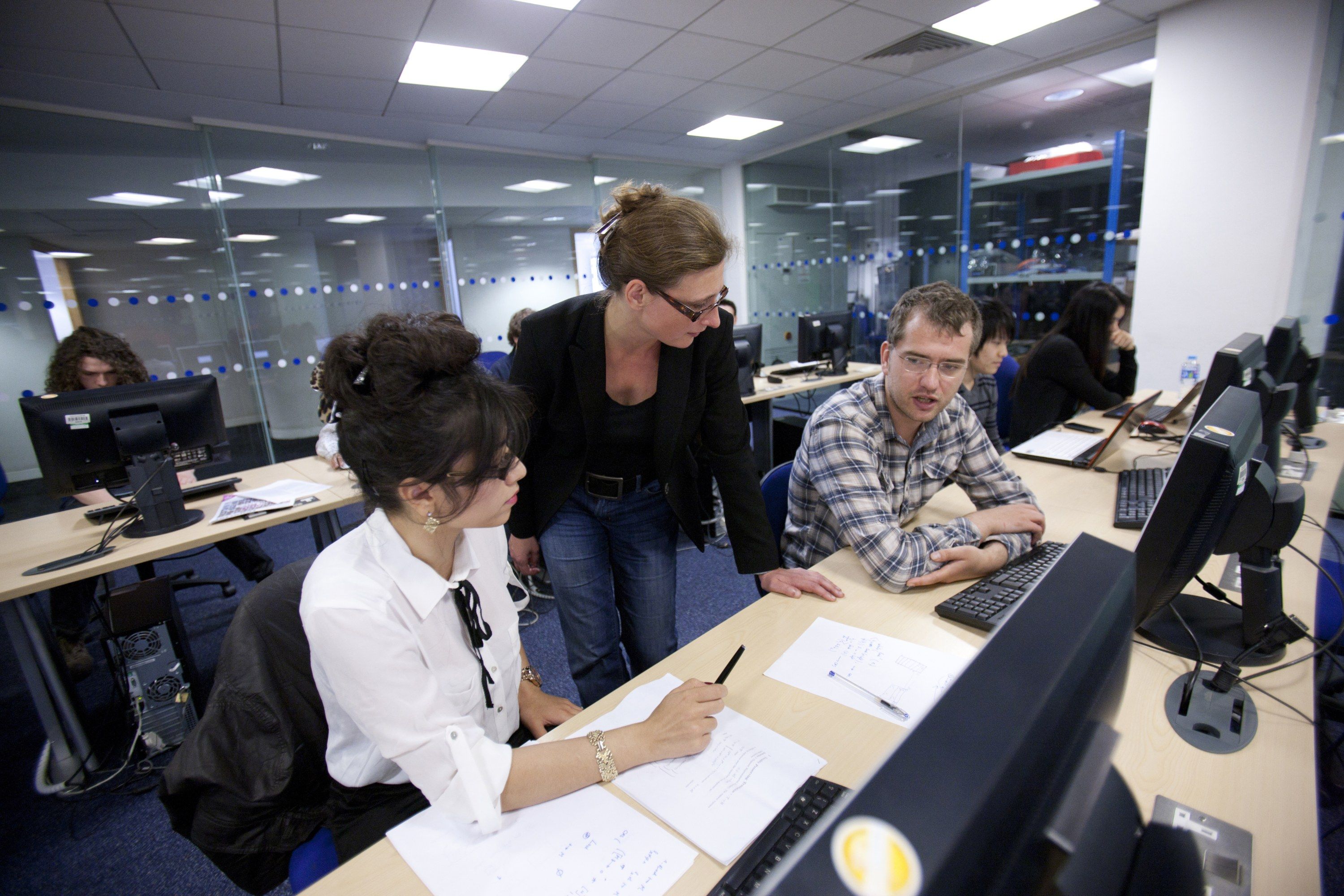
Computing
Deepen your understanding and knowledge of computer science to prepare for a career in the computing industry.
Deepen your understanding and knowledge of computer science to prepare for a career in the computing industry
Explore major programming languages and paradigms alongside management techniques
Join in the development of a large software project and build your problem solving skills
Course key facts
-
Qualification
-
MSc
-
-
Duration
1 year
-
Start date
September 2025
-
Study mode
Full-time
-
Fees
£23,400 Home
£43,800 Overseas
-
Delivered by
-
Location
-
South Kensington
-
Minimum entry standard
-
First-class degree in any subject outside computing or computer science
Course overview
Undertake intensive training in computer science and acquire the core computing skills needed for a career in the computer industry.
Suitable for graduates of disciplines other than computing, this one-year programme is tailored towards those looking to add computing qualifications to their portfolio. It's also suitable if you're looking to retrain in IT or prepare for further PhD study.
This course will help you acquire practical skills in basic and specialised topics in computing. You'll also explore the major paradigms of programming – declarative, imperative and object oriented.
A major focus of your studies will be developing a large software project. You'll also apply your course knowledge on an extended individual project.
This work will help improve your competency in group cooperation, literature search, technical presentation and report writing.
Structure
This page is updated regularly to reflect the latest version of the curriculum. However, this information is subject to change.
Find out more about potential course changes.
Please note: it may not always be possible to take specific combinations of modules due to timetabling conflicts. For confirmation, please check with the relevant department.
You’ll take all of these core modules:
Core modules
Grasp the principles of programming and apply your skills to design and implement solutions to computational programming problems. You will be given the opportunity to practice writing programs and apply methods and techniques learned through laboratory sessions, coursework, and frequent and regular feedback.
Acquire the core knowledge of the organisation and operations of a typical computer system.
Understand the fundamental technologies for designing and building modern software systems, including networking and distributed systems, databases, web services, cloud computing and continuous delivery methods, illustrated via practical exercises and projects.
You must choose five elective modules: either zero or one from Group A; either zero or one from Group B; and either three or four from Group C.
Group A
Gain a foundational understanding of key topics in logic and mathematics required to pursue more specialised modules, such as Logic-based Learning, Introduction to Machine Leaning, Computer Vision, and Graphics. This module is specifically designed for students on a with limited or no logic/mathematics content in their undergraduate degree.
Group B
Develop a thorough understanding of high-performance and energy-efficient computer architecture as a basis for informed software performance engineering.
Understand the basic concepts of quantitative finance and financial engineering and build awareness of the major decision, hedging, and pricing problems in finance.
Assess the best decision algorithms for solving real-life problems arising in computer science, computational management and economics.
Analyse the foundational principles behind decentralised ledgers and apply them to current research in cryptocurrencies.
Group C
Explore how modern database systems are structured and learn about recent developments in database technology.
Explore how images are formed, how they are represented on computers and how they can be processed by computers to extract semantic information.
Understand basic concepts of computer graphics and familiarise yourself with the mathematical principles used for computer generated imagery, shading and light approximations.
Gain insights into the different types of problems that exist in machine learning and the basic algorithms used to address them.
Gain an in-depth understanding of the state-of-the-art of logic-based learning, starting from its key foundation concepts and principles before moving to more recent advances.
Study network and web security broadly from the network to the application layer and understand the main threats, attack techniques and defences relevant to cybersecurity and network security.
Assess modern techniques in realistic computer graphics and image synthesis, particularly image-based techniques for photorealism.
Discover how cryptographic techniques can be used to design and implement secure communicating systems for a variety of different needs and applications.
Examine how probability can be used to make decisions by a computer and advance your understanding of inference networks and linear and non linear methods in statistical pattern recognition.
Review the problems and issues that must be dealt with in constructing robust and flexible distributed applications as well as the underlying network protocols needed to support them.
Learn the techniques required to reliably design and evolve larger software systems and explore key principles of software design.
Examine algorithm design and analysis and the range of approaches and established algorithms for solving common classes of problems.
Discover the basic notions of quantum computing and be introduced to Quantum Bits, Quantum Entanglement and Quantum Algorithms.
Explore applications of artificial intelligence technologies that will improve or transform existing financial, health and other systems.
Demonstrate independence and originality on a substantial and individual project culminating in a dissertation and oral presentation.
Over the final 5 months of your degree you will put into practice some of the techniques that you have learned throughout the course.
The idea for your project may be a proposal from a member of staff, or your own, or a combination of the two.
Teaching and assessment
Balance of teaching and learning
Key
- Taught
- Independent study
- 20% Taught
- 80% Independent study
Teaching and learning methods
-
Lectures
-
Tutorials
-
Practical work
-
Group project work
-
Independent reading
-
Lab work
-
Individual research project
Balance of assessment
Key
- Assessed coursework
- Examinations (practical and written)
- Individual project
- 20% Assessed coursework
- 36% Examinations (practical and written)
- 44% Individual project
Assessment methods
-
Written exams
-
Coursework
-
Reports
-
Presentations and demonstrations
-
Written assignments
-
Lab work
-
Dissertation
-
Oral presentations
Entry requirements
How to apply
Apply online
You can submit one application form per year of entry. You can choose up to two courses.
There is no application fee for MRes courses, Postgraduate Certificates, Postgraduate Diplomas, or courses such as PhDs and EngDs.
If you are applying for a taught Master’s course, you will need to pay an application fee before submitting your application.
The fee applies per application and not per course.
- £80 for all taught Master's applications, excluding those to the Imperial College Business School.
- £100 for all MSc applications to the Imperial College Business School.
- £150 for all MBA applications to the Imperial College Business School.
If you are facing financial hardship and are unable to pay the application fee, we encourage you to apply for our application fee waiver.
Find out more about how to apply for a Master's course, including references and personal statements.
An ATAS certificate is not required for students applying for this course.
Tuition fees
Home fee
2025 entry
£23,400
You should expect and budget for your fees to increase each year.
Your fee is based on the year you enter the university, not your year of study. This means that if you repeat a year or resume your studies after an interruption, your fees will only increase by the amount linked to inflation.
Find out more about our tuition fees payment terms, including how inflationary increases are applied to your tuition fees in subsequent years of study.
Whether you pay the Home or Overseas fee depends on your fee status. This is assessed based on UK Government legislation and includes things like where you live and your nationality or residency status. Find out how we assess your fee status.
If you're a UK national, or EU national with settled or pre-settled status under the EU Settlement Scheme, you may be able to apply for a Postgraduate Master’s Loan from the UK government, if you meet certain criteria.
For courses starting on or after 1 August 2024, the maximum amount is £12,471.
The loan is not means-tested and you can choose whether to put it towards your tuition fees or living costs.
Overseas fee
2025 entry
£43,800
You should expect and budget for your fees to increase each year.
Your fee is based on the year you enter the university, not your year of study. This means that if you repeat a year or resume your studies after an interruption, your fees will only increase by the amount linked to inflation.
Find out more about our tuition fees payment terms, including how inflationary increases are applied to your tuition fees in subsequent years of study.
Whether you pay the Home or Overseas fee depends on your fee status. This is assessed based on UK Government legislation and includes things like where you live and your nationality or residency status. Find out how we assess your fee status.
If you're a UK national, or EU national with settled or pre-settled status under the EU Settlement Scheme, you may be able to apply for a Postgraduate Master’s Loan from the UK government, if you meet certain criteria.
For courses starting on or after 1 August 2024, the maximum amount is £12,471.
The loan is not means-tested and you can choose whether to put it towards your tuition fees or living costs.
How will studying at Imperial help my career?
Develop the essential core knowledge and skills for a computing career.
Consider this course if you're pursuing a career in industry, or if you're interested in a research career in academia or industry.
With an Imperial Computing degree, you'll be able to explore a variety of career opportunities.
Graduates are sought after in roles such as application/web development, networking, AI, media, finance, robotics, and computer games.
Other potential career paths include chip design, cyber security, data management, bio-medical systems and transport
Further links
Contact the department
- Telephone: +44 (0) 20 7594 8298
- Email: doc-mscadmissions@imperial.ac.uk
Course Director: Robert Craven
Visit the Department of Computing website.

Request info
Find out more about studying at Imperial. Receive updates about life in our community, including event invites and download our latest Study guide.

Events, tasters and talks
Meet us and find out more about studying at Imperial.

Terms and conditions
There are some important pieces of information you should be aware of when applying to Imperial. These include key information about your tuition fees, funding, visas, accommodation and more.
You can find further information about your course, including degree classifications, regulations, progression and awards in the programme specification for your course.
Programme specifications